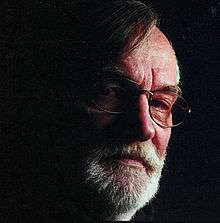Andrzej Kurylewicz

Andrzej Kurylewicz
Andrzej Kurylewicz (born 24 November 1932 in Lwów, died 12 April 2007 in Konstancin-Jeziorna), was a Polish composer, pianist, trombonist, trumpet player and conductor. His works range from serious music, including both chamber and symphonic pieces, to theatrical, film, ballet, and jazz. He was shaped in the tradition of classical and serious music and pioneered Polish jazz, cultivating both areas in parallel.
Life
Education
- Andrzej Kurylewicz's musical education started at the Lwów Music School under Stanisław Ludkiewycz when he was 6 years old.
- From 1946 to 1950 he continued his education at the Instytut Muzyczny in Gliwice.
- From 1950 to 1954 he studied classical piano under Henryk Sztompka and composition under Stanisław Wiechowicz at the Państwowa Wyższa Szkoła Muzyczna in Kraków.
- In 1954 he was excluded from academic life due to his professional involvement with jazz and his refusal to join the PZPR (Polish Communist Party).
Career
- In 1954, by invitation of Władysław Szpilman, he accepts a full-time position at the Polish Radio in Kraków and founds his own ensemble, Sekstet Organowy Polskiego Radia.
- In 1957, he becomes the first Polish musician from behind the Iron Curtain to receive the first prize at the Stuttgart Jazz Festival in West Germany.
- In 1958, he marries the singer Wanda Warska and writes his Opus 1 for piano solo, Somnambulicy and film music for Ostatni Strzał.
- In 1959, he makes his debut as a theatre music composer with Książę Niezłomny by Juliusz Słowacki and directed by Mieczysław Kotlarczyk. In addition, he writes music for the film "Powrót", directed by Jerzy Passendorfer.
- From 1964 to 1966, he directs the Orkiestra Polskiego Radia i Telewizji in Warsaw and loses this position after his recond refusal to join the PZPR.
- In 1964-68 he writes his Opus 2, Concerto na tematy Adama Jarzębskiego (I, II, III).
- In 1965, he sets up Piwnica Artystyczna Kurylewiczów together with his wife, Wanda Warska, and is joined by his daughter Gabriela Kurylewicz in 1987.
- From 1969 to 1978, he becomes founder and leader of the ensemble Formacja Muzyki Współczesnej (Contemporary Music Formation), famous for performing contemporary jazz and European avantgarde music, and they travel across the Western world.
- He establishes himself as a theatrical composer, working together with directors such as Mieczysław Kotlarczyk, Zygmunt Hübner, Adam Hanuszkiewicz, Jerzy Gruza and Erwin Axer, and writes film music for Jerzy Passendorfer, Janusz Morgenstern (Polskie drogi 1976), Ryszard Ber (Lalka 1977, Droga, Domy z deszczu), Janusz Majewski (Sublokator, Lekcja martwego języka), Zbiegniew Kuźmiński (Nad Niemnem), and Janusz Zaorski, (Panny i Wdowy).
- From 1970 onwards, he mainly composes serious music: solo instrumental works (for example Piano Crumbs for piano, Impromptu avec Romarin for harpsichord, Due Pezzi Semplici for organ, Drzeworyt I and II for flute, Moods for double bass and Tubesque for tuba); sacred music (Missa Brevis, Te Deum, Five Psalms after the Roman Missal, Ave Maris Stella, Ave Maria); chamber works (String Quartets I, II, III and IV, String Trio Dormitina and three piano trios Trio per Tre, Tango Rubio, El Dancion Sentimental); piano quintets (Gabriela, Larghetto Kamienie Staromiejskie) and brass trios and quintets. Moreover, he writes for string orchestra (Psalm 60, Szkic do Krajobrazu, Sonet, Serenata Leopolitana, Witraż w Miejscowości N.) and symphonic orchestra (Schema Quatro per Quatro, Adagio da Dramma, Suita Symfoniczna Pan Tadeusz, Suita Symfoniczna Polskie Drogi, two Symphonic Poems In Verona and Godzina się Zniża, Symphonic Sketch Osiem Sekwencji Nad Niemnem and Msza Warszawska).
- He writes congenial song cycles set to the poems of Jan Kochanowski, Juliusz Słowacki, Zygmunt Krasiński, Cyprian Kamil Norwid, Stefan Garczyński, Aleksander Puszkin, Reiner Maria Rilke, Osip Mandelsztam, Czesław Miłosz, Halina Poświatowska, Maria Pawlikowska-Jasnorzewska, Jarosław Iwaszkiewicz, Stanisław Grochowiak, Zbigniew Herbert, Carmina Burana, German baroque poets, Julia Hartwig, Ludmiła Marjańska, Gabriela Kurylewicz and lyrics by Wanda Warska and Agnieszka Osiecka.
- In 1999, he establishes the Kurylewicz Trio (Andrzej Kurylewicz - piano, Paweł Pańta - double bass, Cezary Konrad - percussion) which Bohdan Pociej describes as enchanting by its lightness, charme, elegance, taste, precision, concise harmonies, innovative variations, form and lyricism.
- During his last years, he performs piano works by Karol Szymanowski and Frederic Chopin.
- Every Monday, with his Kurylewicz Trio, with Wanda Warska and Gabriela Kurylewicz he has performed in the Piwnica Artystyczna Kurylewiczów.
- In 1984 he becomes the Composer in Residence of the City of Wilhelmshaven (West Germany) and in 1989 he begins a collaboration with the University of Kansas (USA).
- Rewards: PRTV 1965, Nagroda Miasta Warszawy 1978, Prix Italia 1981, Medal Miasta Warszawy 1997, the German Verdienstkreuz I Klasse 2001, and posthumously, Krzyż Oficerski Orderu Odrodzenia Polski 2007.
- From 2007, accordingly to the will of the composer, Gabriela Kurylewicz and her Fundacja Forma publishes the critical and complete edition of his Opera Omnia, and initiates and produces the annual festival of music and poetry, the Andrzej Kurylewicz Music Days.
- Andrzej Kurylewicz's music is constantly being performed at the Piwnica Artystyczna Kurylewiczów in Warsaw and regularly at Steinway Hall in London; the complete list of his works is available on the website of the Piwnica Artystyczna Kurylewiczów and Fundacja Forma.
External links
- Andrzej Kurylewicz Trio webpage
- Andrzej Kurylewicz at Culture.pl
- Andrzej Kurylewicz - Film Music
- Andrzej Kurylewicz - biography
This article is issued from
Wikipedia.
The text is licensed under Creative Commons - Attribution - Sharealike.
Additional terms may apply for the media files.